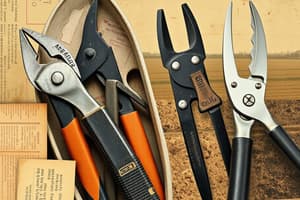Podcast
Questions and Answers
What should be done to tools and equipment at the end of each working day?
What should be done to tools and equipment at the end of each working day?
- Use them to complete any backlogged tasks
- Store them in locked cabinets
- Clean them and check for damage (correct)
- Tag them for inventory
Why must electrical power hand tools be kept free from dust and grease?
Why must electrical power hand tools be kept free from dust and grease?
- To keep them looking new
- To avoid corrosion of metal parts
- To ensure they are easy to store
- To prevent electrical current from traveling over surfaces (correct)
Which tool is specifically designed to prevent ESD damage to computer equipment?
Which tool is specifically designed to prevent ESD damage to computer equipment?
- Screwdriver
- Cleaning cloth
- Diagnostic tool
- Anti-static wrist strap (correct)
What is the purpose of an anti-static mat?
What is the purpose of an anti-static mat?
What category do tools like anti-static wrist straps and mats belong to?
What category do tools like anti-static wrist straps and mats belong to?
What is the primary purpose of an anti-static bag?
What is the primary purpose of an anti-static bag?
Which hand tool is specifically designed to loosen or tighten screws with a star-like depression?
Which hand tool is specifically designed to loosen or tighten screws with a star-like depression?
Which of the following tools would be best suited for cleaning computer components without scratching them?
Which of the following tools would be best suited for cleaning computer components without scratching them?
What is the primary function of a precision screwdriver?
What is the primary function of a precision screwdriver?
What type of tool is a crimping tool primarily used for?
What type of tool is a crimping tool primarily used for?
Flashcards are hidden until you start studying
Study Notes
Tool Maintenance and Safety
- Tools are handheld devices designed to assist in task accomplishment.
- Environmental Safety and Health Program emphasizes cleanliness of tools for efficient work.
- Tools should be cleaned daily, checked for damage, and tagged if faulty for repair or replacement.
- Keep electrical power hand tools free from dust, dirt, oil, and grease to prevent electrical hazards.
- Establish a maintenance schedule for all workshop hand tools and store frequently used tools within easy reach.
Categories of Hardware Tools
- Hardware tools are classified into four main categories: ESD tools, hand tools, cleaning tools, and diagnostic tools.
Electro-Static Discharge (ESD) Tools
- Static electricity can accumulate from friction with various surfaces.
- Anti-static wrist straps prevent ESD damage to computer equipment.
- Anti-static mats are used to stand on or place hardware to avoid static buildup.
- Anti-static bags protect sensitive electrical components from static electricity during storage.
Hand Tools
- Hand tools can be manually operated or electrically powered.
- Common hand tools include:
- Flat head screwdriver: Loosens or tightens slotted screws.
- Philips head screwdriver: Loosens or tightens crosshead screws.
- Torx screwdriver: Used for star-like screws, often found in laptops.
- Hex driver (nut driver): Tightens nuts similar to how a screwdriver tightens screws.
- Needle-nose plier: Holds small parts effectively.
- Wire cutter: Strips and cuts wires.
- Tweezers: Manipulates small components.
- Flashlight/Headlight: Illuminates dark areas.
- Soldering pencil: Joins metal conductors using solder.
- Desoldering tool: Removes unwanted components from circuits.
- Precision screwdriver: Various interchangeable heads for tiny screws.
- Crimping tool: Connects wires to metal components for networking.
Cleaning Tools
- Proper cleaning tools are essential to maintain and repair computers without causing damage.
- Common cleaning tools include:
- Lint-free cloth: Cleans components without scratching.
- Compressed air: Blows away dust without touching parts.
- Cable ties: Neatly organizes cables.
- Parts organizer: Holds small parts to prevent mixing.
- Paint brush: Dusts circuit boards and hard-to-reach areas.
- Rubbing alcohol: Cleans sticky residues with quick evaporation to prevent electrical damage.
Diagnostic Tools
- Diagnostic tools assess circuit integrity and port functionality in computers.
- Important diagnostic tools include:
- LAN Tester: Tests network connections.
- Digital Multimeter (VOM): Measures voltage, current, and resistance; checks circuit functionality.
- Multimeter: Evaluates the integrity of circuits and quality of electricity.
- Loopback Adapter: Tests the functionality of computer ports.
- Toner probe: Generates a tone to trace cables, helping identify cable paths.
Summary
- Understanding and maintaining various tools are crucial for efficient work and safety in computer repair and maintenance tasks.
Studying That Suits You
Use AI to generate personalized quizzes and flashcards to suit your learning preferences.




